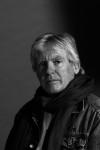Poem
David Harsent
From metals with a memory to brilliant light-emitting solids
From metals with a memory to brilliant light-emitting solids
From metals with a memory to brilliant light-emitting solids
Before daybreak and we were in among rocks,rocks and sandy earth, very dry, carrying bags and sacks
however much each man could lift, or woman or child could lift,
water, of course, and food, whatever we’d grabbed as we left,
clothes and blankets, cups and spoons, kettles and pots.
One or two carried photographs. All the old people wore hats.
We came to a place that seemed right. Someone found sticks.
Two of the men had carried fire on their backs
and kept it alive in the usual way, so at least we could cook
rice and lentils, and boil water for tea, and smoke.
Dawn came fast: a summer sun. We could see the wrecks
out on the plain: hobbled hardware. The children played jacks
with the bits and bobs, the shiny castoffs they’d found out there
while the men sat round in a ring and debated where
next, how fast, whether in darkness, what chance . . .
One should be sent out, was the upshot of that; sent in advance
through the next valley, to see if the map was right, to scout
for streams or falls, perhaps to catch sight
of something familiar or safe, to sniff the wind, to choose
the way. I was the one because young and because of my shoes
which had ankle-thongs and soles from Firestone radial ATX
the better to get me across the limestone stacks.
I walked a while, then turned to take a measure with my thumb
holding it up to mark a mile, when I heard this hum
in the air, low at first but quickly growing shrill
like women in grief. I could see them, one and all,
on the rocky rise where we’d stopped; they were standing up
and looking my way. The odd thing was you could watch it slip
between the valley walls, low and going a rare old clip
and I wondered: how did it know, how did it get the drop
on a group so far out? As if it had lost them at first
but not forgotten. What happened then happened fast:
in the second before I heard the strike
I saw them ignite, all fifty/sixty or so at a stroke,
each caught in place, burning stock-still and upright
single beacons at first, then merging, then lost in their own light.
© 2008, David Harsent
Publisher: To be included in a future publication from Faber & Faber,
Publisher: To be included in a future publication from Faber & Faber,

David Harsent
(United Kingdom of Great Britain and Northern Ireland, 1942)
David Harsent won the 2005 Forward Prize for Legion, which was also shortlisted for the Whitbread Prize and the TS Eliot Award; he has also been the recipient of the Geoffrey Faber Memorial Award, an Eric Gregory Award, two Arts Council bursaries and a Society of Authors Fellowship.
David Harsent’s work is both varied, and like that of all important writers, instantly recognisable. He is also co...
David Harsent’s work is both varied, and like that of all important writers, instantly recognisable. He is also co...
Poems
Poems of David Harsent
Close
From metals with a memory to brilliant light-emitting solids
Before daybreak and we were in among rocks,rocks and sandy earth, very dry, carrying bags and sacks
however much each man could lift, or woman or child could lift,
water, of course, and food, whatever we’d grabbed as we left,
clothes and blankets, cups and spoons, kettles and pots.
One or two carried photographs. All the old people wore hats.
We came to a place that seemed right. Someone found sticks.
Two of the men had carried fire on their backs
and kept it alive in the usual way, so at least we could cook
rice and lentils, and boil water for tea, and smoke.
Dawn came fast: a summer sun. We could see the wrecks
out on the plain: hobbled hardware. The children played jacks
with the bits and bobs, the shiny castoffs they’d found out there
while the men sat round in a ring and debated where
next, how fast, whether in darkness, what chance . . .
One should be sent out, was the upshot of that; sent in advance
through the next valley, to see if the map was right, to scout
for streams or falls, perhaps to catch sight
of something familiar or safe, to sniff the wind, to choose
the way. I was the one because young and because of my shoes
which had ankle-thongs and soles from Firestone radial ATX
the better to get me across the limestone stacks.
I walked a while, then turned to take a measure with my thumb
holding it up to mark a mile, when I heard this hum
in the air, low at first but quickly growing shrill
like women in grief. I could see them, one and all,
on the rocky rise where we’d stopped; they were standing up
and looking my way. The odd thing was you could watch it slip
between the valley walls, low and going a rare old clip
and I wondered: how did it know, how did it get the drop
on a group so far out? As if it had lost them at first
but not forgotten. What happened then happened fast:
in the second before I heard the strike
I saw them ignite, all fifty/sixty or so at a stroke,
each caught in place, burning stock-still and upright
single beacons at first, then merging, then lost in their own light.
From metals with a memory to brilliant light-emitting solids
Sponsors














Partners
LantarenVenster – Verhalenhuis Belvédère

